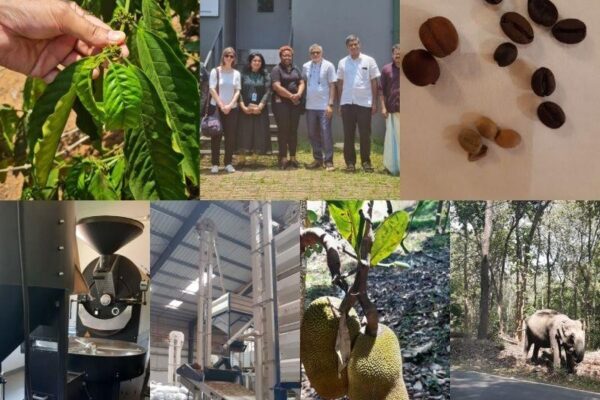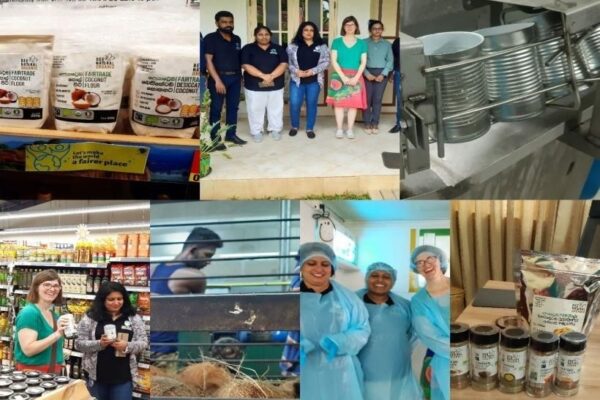Advocating for Fairtrade products is essential in generating awareness regarding their advantages and stimulating market interest. It aids in the promotion of sustainable farming methods, assistance for small-scale farmers, and the establishment of fair practices. Through advocacy, Fairtrade can foster a resilient and equitable network that has an enormous impact on the livelihood of farmers and workers. These can only be achieved when farmers and workers are considered as main actors of the network and use their inputs and support at the regional level.
To discuss specific strategic advocacy nuances for India, Sri Lanka, Indonesia, the Philippines, and Uzbekistan for developing the Regional Advocacy Strategy, a workshop was organised by FT NAPP with Think Through Consulting Ltd. (TTT) in April. It was attended by Sophie Aujean Director of Global Advocacy- Fairtrade International and representatives from Fairtrade NAPP and FT India. The Regional Advocacy Strategy will aim at creating a strategic framework that will help NAPP in establishing itself as a critical participant in the regional dialogue on Fair and sustainable business practices.

Some of the topics covered during the discussions included:
- Advocacy on issues discussed by the European Union (such as forced labour, ban of pesticides, empowering consumers directive, etc.).
- Summit on LI in cocoa in West Africa, 2023 United Nations Climate Change Conference (COP 28).
- Sustainable agriculture rollout.
- Strengthening policy expertise in gender and trade.
- Advocating strategies on coffee and cocoa.
The consultancy group presented various important strategies that can be adopted in the near future. These strategies included discussion about agreement on advocacy goals and KPIs, establishing advocacy platforms, organizing workshops with Producer Network for peer learning and development on advocacy among the producer networks, enabling fluid conversation with Fairtrade Advocacy Office (FTAO) and exploring S2S in order to implement solutions from a holistic approach. The workshop focused on various multilayered aspects such as cross-border tariffs, local and national product-based policies/laws, implementation of policies by governments, and thematic focus on climate, workers’ rights, trade and market development (S2S).
A session was also conducted by Abhishek Jani, the CEO of Fairtrade India to discuss Fairtrade India’s outlook and work with the participants. Despite strong advocacy, the advocacy for Fairtrade is delicate in India due to its current geopolitical scenarios. It organized various events such as a trade justice walk organised in partnership with the World Fairtrade Organization (WFTO) in addition to bringing a new ecosystem of businesses, platforms for producers and activities to engage more consumers. One of the main highlight events was establishing Fairtrade Towns aimed at building a bridge between consumers and producers, attracting media coverage and events to raise awareness of the range of FT products while following the organization’s principles. These strategies were developed to achieve the following objectives-
- Establishing credibility and relationship with local/national governments.
- Strengthening partnerships among various actors in the network.
- Strengthening capacities at ground level to advocate for change.
- Promoting cooperation and synergies among various actors for mutual benefits.
The workshop concluded with consultants advocating for core implementation initiatives to achieve the strategic objectives. Sanjeet Singh Khurana; Executive Director, Fairtrade NAPP emphasized the importance of engaging with five specific countries initially and replicating the approach with other countries. Overall, the workshop exhibited energy, commitment, and alignment among the participants, showcasing the progress made over the past year and looking forward to finalizing the advocacy strategy and its implementation.

Visitations to producer organizations in the Indian state of Kerala and Sri Lanka were also organized by NAPP for Sophie Aujean Director of Global Advocacy- Fairtrade International to understand challenges and Fairtrade impacts on the ground. In addition to being centrally funded by the government, the producer organization in the Indian state of Kerala received a premium of 9.2 million Indian rupees that were spent on farmer welfare and operational improvements. In Sri Lanka alone, Fairtrade has benefited 67 traders, 26 Hired Labour Organizations (mostly in tea production) and 24 Small Producer Organizations out of which, the participants visited a producer organization that consisted of 300 producers.

Simultaneously, the participants also visited the Chair of the Export Development Board (EDB) and the former Chair of the Sri Lanka Marketing Institute (SLIM) to discuss a possible framework agreement that will support and prepare Sri Lankan producers/artisans to be certified, enabling policy environment, creating awareness and opportunities for Fair Trade in Sri Lanka. These visitations were very important as they gave Fairtrade an opportunity to understand various perspectives and curate more advocacies that are beneficial for all. Fairtrade believes in advocacy at the highest level as it is an enabler for the rest of our strategy pillars!






